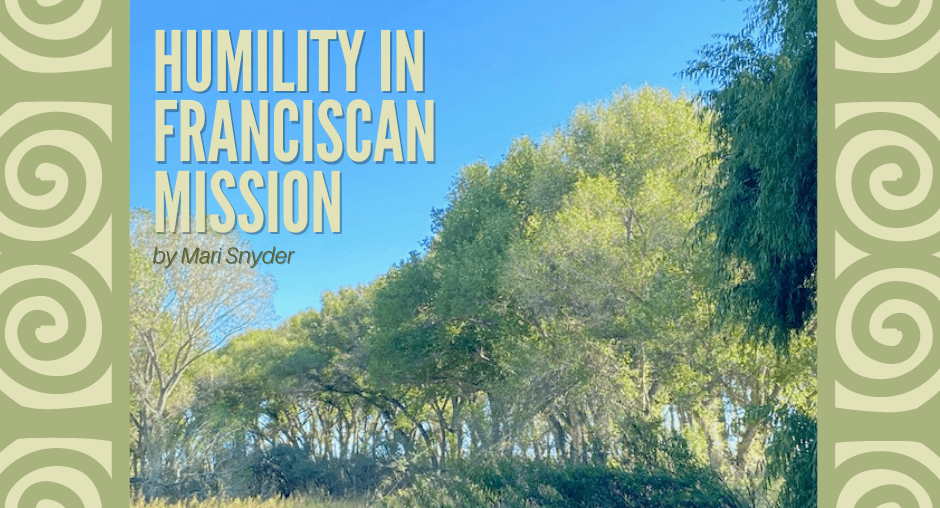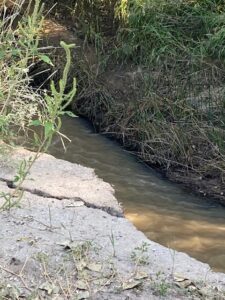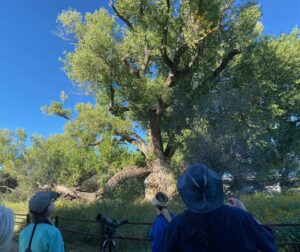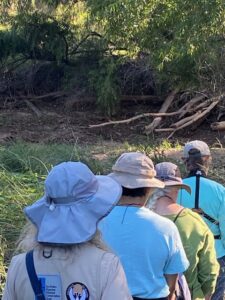Humility in Franciscan Mission

Editor’s note: Missioner Mari Snyder reflects on how she is learning humility, a key Franciscan value, through her ministries in the US-Mexico border region.
Experiencing humility on mission is an oh-so-very-frequent occurrence. The words minor and lesser and to live on the margins of society are words used within the Franciscan community to describe – indeed, to evoke – authentic humility. It’s a workout to learn its lessons, as you’ll see from my experiences below.
In migrant ministry…
Once I cross the Border, I’m the one who has a different skin color, is from a different country, and doesn’t speak as much of the language as she should. I’m “the minority” in Mexico, claro (of course).
I’ve found migrants, fellow volunteers and the community are extremely patient, very kind and respectful as I work on my Spanish, but it is so easy to imagine that you’re being talked about, laughed at, left out. It stuns me how quickly I can return to early memories of being a “sidelined” schoolgirl again. Sometimes it is easier to “take a place on the margins” cleaning and organizing at the migrant center, than to be in the midst of a friendly group of fellow volunteers and be brave enough – and fast enough – to say something with the limited vocabulary and verb tenses I know.
In prison ministry…
Visiting men in the local Douglas, AZ, prison makes for a deeply moving Monday evening. Many often convey a deeper spiritual richness and introspection than I have, and they are the ones who need space and freedom to talk, to be who they are in full.
I have begun to assess the residents/visitors ratio, yielding time or using my turn in the circle to quickly express my appreciation for their reflection. It is enough to be present, to be their company. I no longer work to add something new or different to the conversation as I generally try to do to prove I can contribute, I’m smart, worthy. I would be taking time from them. Just because I can doesn’t mean I should.
In the children’s community center…
I’m neither a maestra (teacher) nor madre (mother), so with up to 15 Agua Prietan children, ages 5-12, I use every tool I can to communicate using simple Spanish conversation, my Google translated lesson plans, facial expressions and, of course, charades! It must be funny to watch as I convey an English lesson, show how to play a boardgame, demonstrate an arts & crafts activity, and teach proper printing and cursive writing.
These children are my heroes and she-roes. They never—not ever—get frustrated when I say “Yo no comprendo, lo siento (I’m sorry).” There’s no judgment. They simply take in their environment and figure out what is best for them to do next for everyone’s benefit. They humble me with their unflappable patience and understanding, their joy and affection, their Hola and Adios “hip hugs.” They show me what it truly means to live in peace, to love your neighbor as yourself.
The Peace Prayer of St. Francis, which captures our saint’s charism and call, purpose and practice, never mentions humility, but it doesn’t have to… the whole prayer captures the practice of humility, of emptying oneself for the sake for others and God, of building the beloved community. It is counter-culture and relational; may it bring a fortifying perspective to you, as it does to me, when you next exercise humility, experience minority, are the lesser.
May it bring you peace.
Lord, make me an instrument of your peace.
Señor, haz de mí un instrumento de tu paz.
Where there is odio (hatred), let me sow amor (love)…
Where there is ofensa (injury), perdón (pardon),
Where there is duda (doubt), fe (faith),
Where there is desesperación (despair), esperanza (hope),
Where there is oscuridad (darkness), luz (light),
Donde hay tristeza (sadness), alegría (joy).
O, Divine Master, grant that I may not seek so much to be consoled as to console,
O, Divino Maestro, que no busque tanto ser consolado, como consolar,
To be understood (comprendido) as to understand (comprender).
Ser amado como amar.
For it is in giving that we receive,
Porque es dándose como se recibe,
It is in pardoning that we are pardoned,
es perdonando, como se es perdonado,
And it is in dying that we are born to eternal life.
Y es muriendo como se resucita a la vida eterna. Amén.
Creation’s Lesson in Humility: Rhonda, Julia and Mari, along with other visitors to the San Pedro Riparian National Conservation Area in southeast Arizona, view the downed limb of a nearly 100-year-old majestic Freemont Cottonwood that flanks the border-crossing and north-flowing San Pedro River.
Question for Reflection: When was the last time you experienced humility, and what lesson did it offer?
Tagged in:




